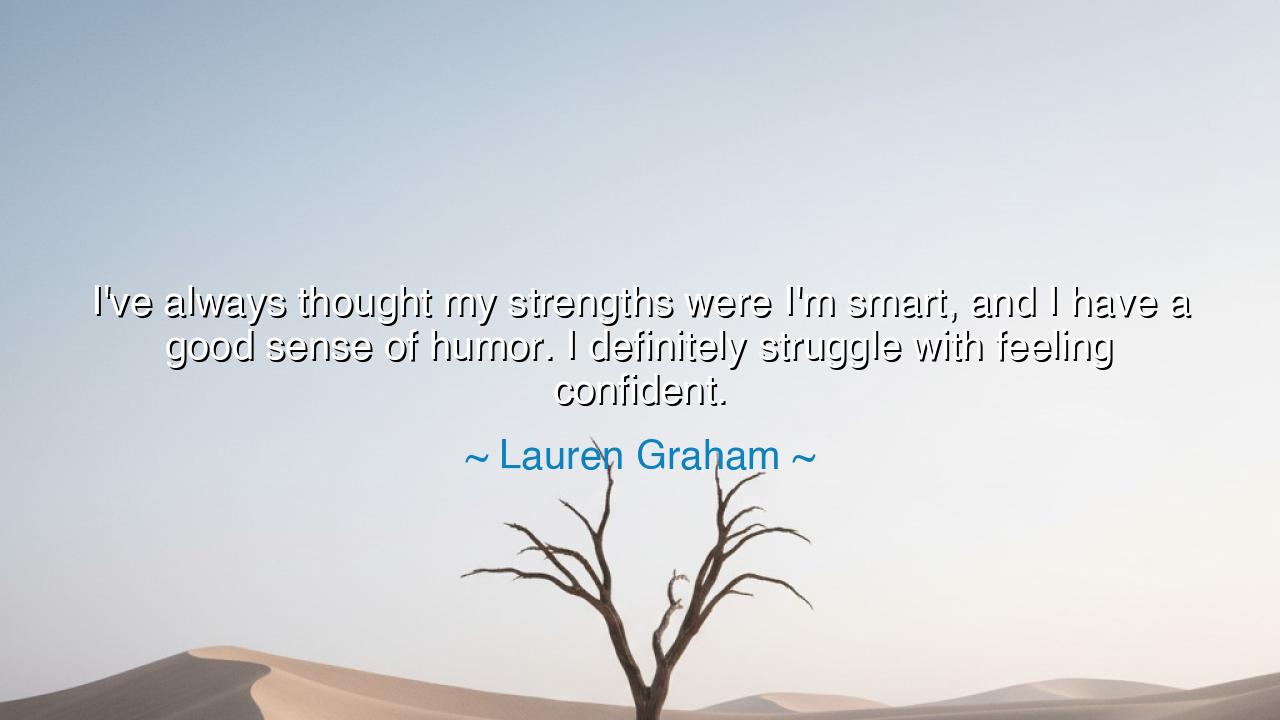
I've always thought my strengths were I'm smart, and I have a
I've always thought my strengths were I'm smart, and I have a good sense of humor. I definitely struggle with feeling confident.






When Lauren Graham said, “I've always thought my strengths were I'm smart, and I have a good sense of humor. I definitely struggle with feeling confident,” she gave voice to a truth that echoes in the hearts of countless souls: that intelligence and wit, though bright, cannot always silence the quiet storm of self-doubt. Beneath her gentle words lies a paradox as old as humanity — the struggle between self-awareness and self-belief, between knowing one’s gifts and truly embracing them. It is a confession of humility, but also of the eternal conflict between the mind that knows and the heart that hesitates.
Lauren Graham, celebrated for her wit, warmth, and depth as both actress and writer, stands among those who make others laugh while silently wrestling with their own inner silence. In this quote, she unveils a truth often hidden behind humor: that laughter is sometimes a shield, and intellect, a refuge. She acknowledges her strengths — intelligence and humor — not as weapons of pride, but as companions in her lifelong dialogue with confidence. This honesty gives her words their power. She does not boast, nor does she hide. She speaks as one who has walked through both light and shadow and dares to tell the world that wisdom does not always bring certainty.
The ancients, too, knew this struggle. Socrates, the wisest of the Greeks, declared, “I know that I know nothing.” Though he was revered as a philosopher, his wisdom was born not from arrogance, but from humility — from the recognition that knowledge itself awakens a deeper awareness of one’s limitations. So it is with Graham: her intelligence does not blind her to her weaknesses; it illuminates them. And her humor, like that of the great jesters and poets of old, becomes a form of courage — a way to stand before the world with grace, even when her confidence trembles. For humor, when born from self-awareness, is not mere jest; it is resilience disguised as laughter.
Consider the life of Eleanor Roosevelt, a woman who led nations through her quiet strength but confessed to lifelong insecurity about her looks and worth. She once said, “No one can make you feel inferior without your consent.” Like Graham, she understood that self-doubt is not the absence of worth, but the battlefield upon which worth is tested. Both women — one a First Lady, the other a storyteller — reflect the same truth: that confidence is not gifted; it is forged. It is not the denial of weakness, but the acceptance of one’s whole self, both fragile and strong.
Lauren Graham’s words also speak to the modern soul, weary from comparison and performance. In a world that rewards confidence as spectacle, her humility is a reminder that true strength lies in authenticity. To admit insecurity is not weakness; it is bravery of the highest order. Many hide behind masks of certainty, but she, like a sage of laughter, reminds us that humor can coexist with doubt, and intellect can live alongside vulnerability. The ancient poets would have called such honesty humanitas — the full embrace of our flawed, beautiful humanity.
Her struggle with confidence is not unique; it is universal. Even the heroes of legend trembled before their greatness. Moses doubted his voice, Odysseus questioned his strength, and Buddha wrestled with his own fear before enlightenment. Confidence, like faith, is not a constant flame but a fire tended daily. It flickers when winds of doubt arise, yet it endures in those who refuse to let it die. Graham’s words remind us that the path to self-assurance is not paved with perfection, but with perseverance — the courage to rise each time we waver and to smile, even when the heart quakes.
Thus, her teaching to future generations is clear: honor your gifts, but forgive your uncertainty. Intelligence and humor are not mere ornaments — they are tools of light in a world that often feels dim. Yet even the brightest mind may falter, and that is no shame. True confidence grows not from the absence of fear, but from the will to act despite it. Laugh at your doubts, as Graham laughs at hers. Speak truth with wit, and let your humility be your strength.
For in the end, as Lauren Graham shows us, confidence is not the thunder of certainty, but the quiet courage to continue — to create, to speak, to live — even while trembling. And those who can laugh in the midst of their doubt, who can shine despite their shadows, carry within them the oldest and deepest wisdom of all: that the soul’s truest beauty is found not in perfection, but in honest humanity.






AAdministratorAdministrator
Welcome, honored guests. Please leave a comment, we will respond soon